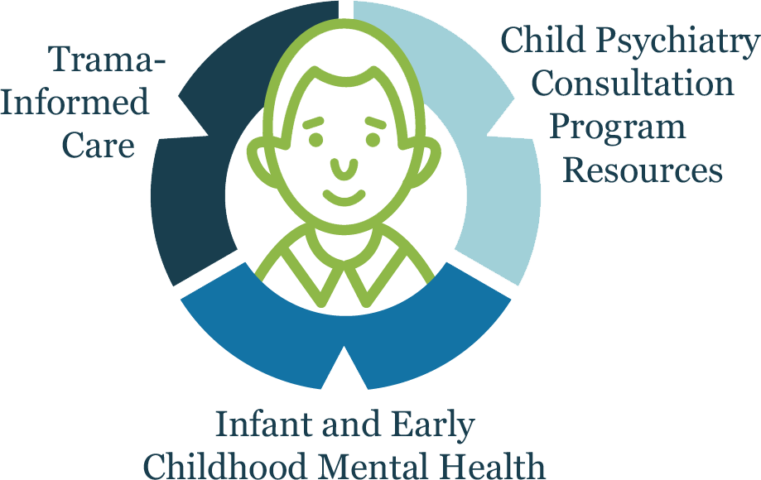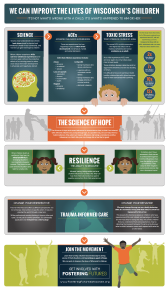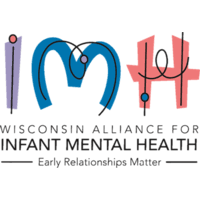A Strategic Priority
As their first and primary care physician, pediatricians see patients from birth on and are often the first consults for parents concerned with their child’s mental health. In addition, a national shortage of child and adolescent psychiatrists has led to an increased reliance on pediatric practitioners to appropriately provide treatment for mental health diagnoses. Combined with the broad and intricate spectrum of mental health diagnoses that can present between birth and young adulthood, pediatricians often report they are ill-prepared to recognize and appropriately treat young patients.
Half of all lifetime mental health illnesses begin by age 14 and you are the front line of support for these concerns in children and youth. This disproportionate reliance on pediatric practitioners can lengthen the time to appropriate treatment for children and adolescents. Tragic national events involving teenagers with mental health problems have placed an even greater emphasis on the need for improvement of our mental health system for youth. Mental Health, therefore, remains a strategic priority for WIAAP.
WIAAP will continue to provide resources related to mental health with three key assets: Adverse Childhood Experiences resources, Infant Mental Health resources, and Child Psychiatry Consultation Program resources.
WIAAP will continue to provide resources related to mental health with three key assets:

Trauma-Informed Care
According to the Center for Disease Control (CDC), the Adverse Childhood Experiences (ACE) Study is one of the largest investigations ever conducted to assess associations between childhood maltreatment and later-life health and well-being. Existing and ongoing research demonstrates the need to understand resiliency and healing as they relate to children’s mental health, including the emerging understanding of infant mental health.
Wisconsin Office of Children’s Mental Health (OCMH)
The Office of Children’s Mental Health (OCMH) was created in the 2013-2015 biennial budget to support Wisconsin’s children in achieving their optimal social and emotional well-being. We work to:
- Improve children and families access to services, with a focus on resources provided by the Department of Health Services, Department of Children and Families, Department of Public Instruction, and Department of Corrections, in addition to other Wisconsin organizations;
- Facilitate communication with all child- and family-serving state agencies, coordinate initiatives, and monitor program performance focused on children’s mental health; and
- Support administrative efficiencies to reduce duplication among child- and family-serving state agencies.
As part of OCMH’s Collective Impact Council, WIAAP co-leads the Trauma-Informed subcommittee, which surveys TIC training from awareness to implementation, has begun mapping TIC activities in the state and conducts quarterly TIC training workshops on topics such as environment, human resources, and consumer involvement. This work is done in concert with groups focusing on Resilience and Access. Most importantly, OCMH integrates consumer voice at every level of policy discussion, including the Collective Impact Parents (CIPs), a leadership group of parents and teens advocating for resiliency and healing.
The Wisconsin Children’s Trust Fund (CTF)
CTF’s primary goal is the prevention of first-time occurrences of child abuse and neglect. To do so, they employ four key strategies:
- Develop and advocate for effective prevention policies
- Promote evidence-based practices and develop innovative programs that support parents and caregivers
- Collaborate with key stakeholders to leverage resources and implement prevention initiatives
- Educate professionals and community members on child abuse and neglect issues
Fostering Futures
 Fostering Futures’ vision is that all Wisconsin children and families are thriving in nurturing communities; individuals, communities, and government integrate trauma-informed, strength-based principles into their relationships, culture, policies, and practices, promoting safe, stable, and nurturing relationships. By participating in safe, nurturing relationships with a child, we can promote the consistency, stability and resiliency necessary for a child’s health and future success in life.
Fostering Futures’ vision is that all Wisconsin children and families are thriving in nurturing communities; individuals, communities, and government integrate trauma-informed, strength-based principles into their relationships, culture, policies, and practices, promoting safe, stable, and nurturing relationships. By participating in safe, nurturing relationships with a child, we can promote the consistency, stability and resiliency necessary for a child’s health and future success in life.
If you suspect a child you know may be unsafe, please click here to find out how to report it.
Infant and Early Childhood Mental Health
Did you know that strong mental health begins right away with infants, toddlers and preschoolers? Early relationships matter. Our youngest children and their caregivers benefit from early intervention and strategies to build safe, nurturing environments for families.
Infant Mental Health is the developing capacity of the child from birth to five to:
- Experience, regulate and express emotions
- Form close and secure interpersonal relationships
- Explore the environment and learn
… all in the context of family, community and culture. (Adapted from Zero to Three’s Infant Mental Health Task Force, 2002.)
 Wisconsin Alliance for Infant Mental Health (WI-AIMH) leads the way in advocacy and education surrounding the value of mental health consultation for infants and toddlers. WIAAP partners with WI-AIMH, public health and advocacy organizations to encourage the use of mental health consultation for parents and caregivers, home visitors, Head Start, special education, early care and education, faith-based organizations and other places kids grow and learn.
Wisconsin Alliance for Infant Mental Health (WI-AIMH) leads the way in advocacy and education surrounding the value of mental health consultation for infants and toddlers. WIAAP partners with WI-AIMH, public health and advocacy organizations to encourage the use of mental health consultation for parents and caregivers, home visitors, Head Start, special education, early care and education, faith-based organizations and other places kids grow and learn.
Consultation with trained early childhood mental health professionals gives our youngest kids and their caregivers strategies for positive behavior long before they start school, so all kids are ready to learn. Long-term, kids grow up to be more successful, more prosperous and more engaged members of our communities. Understanding the socio-emotional needs of children before they start school readies them for lifelong learning and success.
As Wisconsin embraces consultation as a valuable early prevention and intervention strategy, it is critical to have a shared understanding of best practice guidelines for what infant and early childhood mental health consultation is, how it’s delivered and who should be providing it. These guidelines were developed by this group of Wisconsin experts, to provide specific frameworks for who, where, when and how infant mental health consultation should be provided.
Child Psychiatry Consultation Program (CPCP)
About the Child Psychiatry Consultation Program (CPCP):
The goal of the CPCP is to improve mental health care for children in the state of Wisconsin. This is accomplished by educating the enrolled primary care providers, as well as providing timely consultation with child psychiatrists, child psychologists, and social workers so primary care providers can deliver better-informed mental health care. This allows children to be seen for their mental and behavioral health care needs sooner, in their medical homes, by their provider who is receiving education and consultative support from a child psychiatrist.
For more information on the CPCP, visit chw.org/cpcp.

